Greetings from JELI: It’s Been A While!
Dear Readers,
As we bid farewell to 2023 and embraced the new year of 2024, JELI missed the opportunity to extend our wishes for a happy New Year. However, we seize this month of Songkran to wish everyone a joyous Thai New Year. Over the past four months, JELI has remained steadfast in our commitment to promoting labor rights.
In this edition of our newsletter, JELI aims to provide a comprehensive account of the important events that have occurred in the past four months. We invite you to delve into the latest developments and insights on the labor movement in Thailand with us.
Important News
5 Years of Thai Riders: Battles Against Platforms
Since its inception in 2013, the role of “riders” has rapidly evolved, especially with the advent of platforms like Grab, which debuted in Thailand as the pioneer. Over time, this profession has gained immense popularity, particularly during the COVID-19 pandemic, where job losses prompted many to turn to delivery work. Throughout their journey, riders have faced various challenges in their line of work.
Rocket Media Lab has compiled data spanning 5 years, from 2019 to 2023, on Thai platform workers and their battles with platform companies. Here are the key findings:
- From 2019 to 2023, there were a total of 113 protests by platform workers, distributed as follows: 4 in 2019, 6 in 2020, 45 in 2021, 42 in 2022, and 16 in 2023.
- The platform with the highest number of protests was Line Man (62), followed by GrabFood (23), Food Panda (17), Lalamove (7), and 4 other platforms. These protests were often communicated to the government and political parties via formal letters from the workers.
- The majority of the demands made during these protests, totaling 113, revolved around fare and compensation issues, accounting for 93 instances. This was followed by complaints related to job allocation and payment systems (42 instances) and welfare and labor protection concerns (15 instances).
- Out of the 113 protests, platforms conceded to the workers’ demands only 20 times, accepting all demands in 7 instances and partially conceding in 13 instances.
Since 2021, the Just Economy and Labor Institute has been conducting surveys on platform workers, initially focusing on those in the Bangkok area but later expanding to other regions in Thailand. These surveys, updated annually, provide insights into the conditions of Thai platform workers. Between June and July 2023, the institute surveyed over a thousand on-demand platform-based riders. The results showed that 96 percent of respondents worked long hours daily, with three-quarters feeling a high level of job insecurity. Nearly half found their payment inadequate, and over two-fifths faced income uncertainty.
A comparison between such a broader overview and JELI’s detailed survey in 2023 sheds light on platform workers’ concerns. The survey found dissatisfaction with occupational welfare, safety, and discrimination, while pay and job instability were considered pressing issues. Payment and work safety were identified as immediate concerns, along with transparency in regulations and contracts. As shown from the 5-year data, despite numerous incidents, only a fraction led to responses from platform companies. In response to the platforms’ inaction, workers turned to government authorities, political parties, and the media due to the absence of collective bargaining mechanisms and limited associational power.
As riders are not officially recognized as employees, their ability to negotiate has weakened. However, riders have started coming together, forming groups to strengthen their bargaining power with platforms and better advocate for their needs. These alliances also provide support networks for riders, based on the objectives of each group.
Source: Rocket Media Lab
Riders Are “Employees”, Not Business Partners
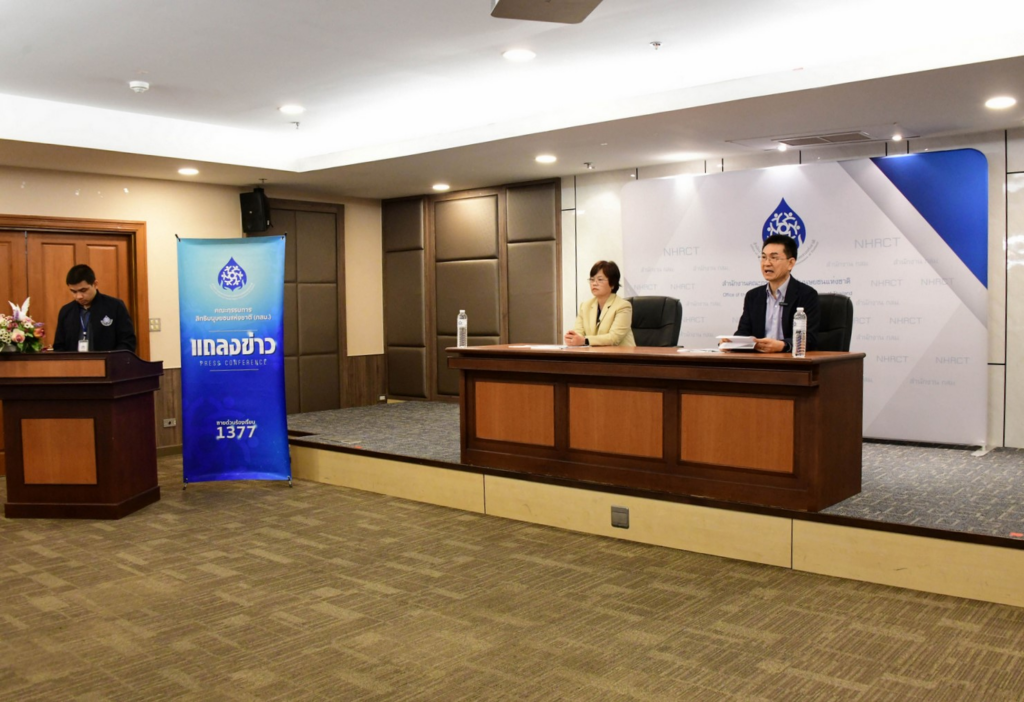
The National Human Rights Commission of Thailand (NHRC) made a statement last March, validating platform workers’ status as employees, not business partners as claimed by the platform companies. This distinction is crucial as it ensures their access to labor rights and benefits. NHRC emphasized the urgency of addressing potential human rights violations and ensuring adequate social protections for platform workers.
In April 2023, NHRC received complaints against four platform companies for circumventing labor laws and social security regulations by hiring individuals as “partners” instead of employees. Workers are denied basic rights such as insurance coverage and are often subjected to exploitative working conditions. This exploitation is further exacerbated by the unequal power dynamics between platform companies and workers, where workers have little to no bargaining power.
What many may not realize is that the submission of the complaint stemmed from a sequence of interactions with political parties facilitated by JELI. During the event titled “Bridging Perception and Reality,” held on March 18, 2023, Pisit Lee-artham, a former Ministry of Finance member from the Democrat Party, committed to presenting the complaints to the NHRC.
In response, NHRC proposed recommendations to safeguard platform workers’ rights, including criteria for compensation and regulation of working hours, leave, and holidays. NHRC also urged the Ministry of Labor to study the impact of treating riders as “employers and employees” and establish measures for fair labor practices, possibly through ministerial regulations similar to existing Labor Protection Acts.
The recognition of platform workers’ status by NHRC marks a significant milestone in their ongoing struggle for rights. It holds importance not only for the workers themselves but also for JELI’s ongoing and future endeavors. This recognition underscores the need for continued collective efforts to advocate for the rightful protection of workers until the principles of labor rights are fully realized.
Source: The Active
Empowering Women: Reflections on International Women’s Day
Every year on March 8th, we celebrate International Women’s Day. As we reflect on this empowering day, it is crucial to shine a light on the challenges faced by female workers in the gig economy.
In the gig economy, female riders often face significant challenges beyond the risks associated with their work, such as health issues. One concerning issue that female riders have to confront is gender-based violence. Some are subjected to harassment, while others are coerced into sexual encounters by customers. Moreover, they may experience verbal abuse or unwanted advances, with little recourse when complaints are made to the companies. It’s not just about establishing workplace policies; platform companies must design policies that protect workers from gender-based violence, provide appropriate assistance and support, and screen customers to ensure the safety of both parties.
Events
January 18th, 2024 – JELI’s Founder and Managing Director, Kriangsak Teerakowitkajorn, participated in the symposium, “Global labor movements in dialogue: Strikes and political power in Asia and the US”. This symposium was co-organized by JELI, School of Labor and Urban Studies, City University of New York, Asian Labor Review, In These Times, and IndoPROGRESS.
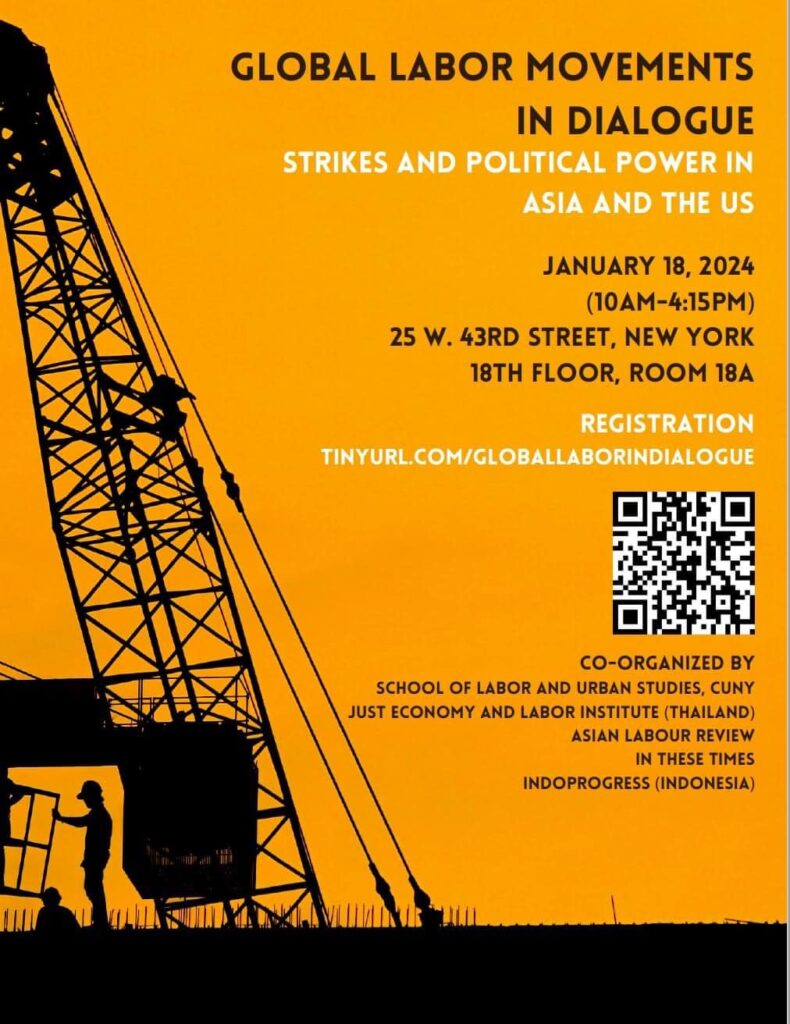
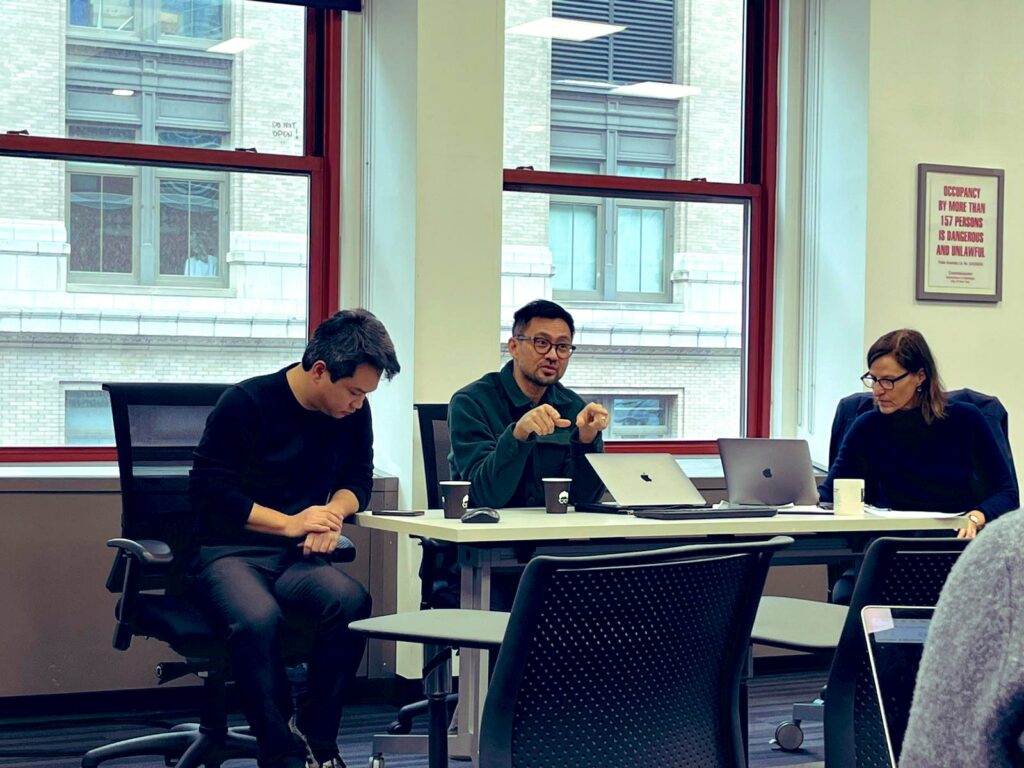
March 29th, 2024 – JELI organized a participatory workshop to promote the formation of platform workers’ organizations titled “Participatory Workshop in Organizing Platform Workers for Trade Union” under the GLP-POWER project, supported by USAID and Solidar Suisse. The workshop, held in Bangkok, commenced with an overview of organizing platform workers in Thailand by Sakdina Chatrakul Na Ayudhya, an advisor to JELI. The workshop included three sessions.
During the initial session, representatives from various rider groups from Bangkok and other provinces, as well as massage therapist representatives from the social enterprise “Thai Spa Therapy”, reflected on their experiences with alternative forms of gig workers’ organizations. They exchanged problems encountered in their work that led to unionization efforts to demand fair compensation and protection. Successful case studies of rider group unionization were also discussed.
In the roundtable discussion, the main topic was alliance and solidarity building. In addition to rider representatives, there were also representatives from the Creative Workers Union (CUT) and the Thai Frontline Physician Union presenting ideas to strengthen the trade unions, link various types of workers, establish common frameworks, expand worker membership, and consolidate bargaining power.
The final session involved brainstorming on the way forward to achieving platform workers’ goals. Discussions covered various aspects, including communication strategies to find common ground for mutual assistance, employment status of platform workers, labor law protection, guaranteed minimum daily wage, and gender-based discrimination and sexual harassment in a work environment. It is indicated that the main issue prioritized by platform workers and participants is the demand for Social Protection and concern regarding Gender-Based Violence.
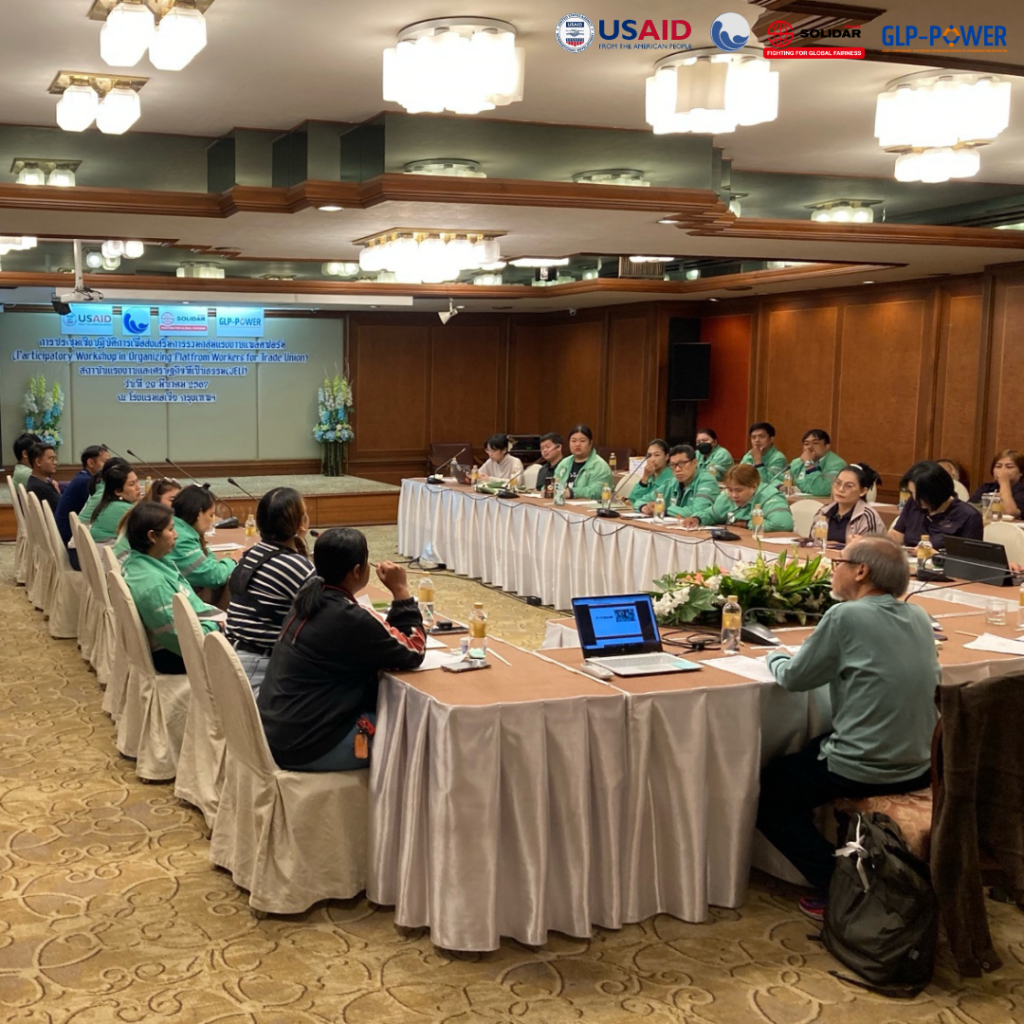
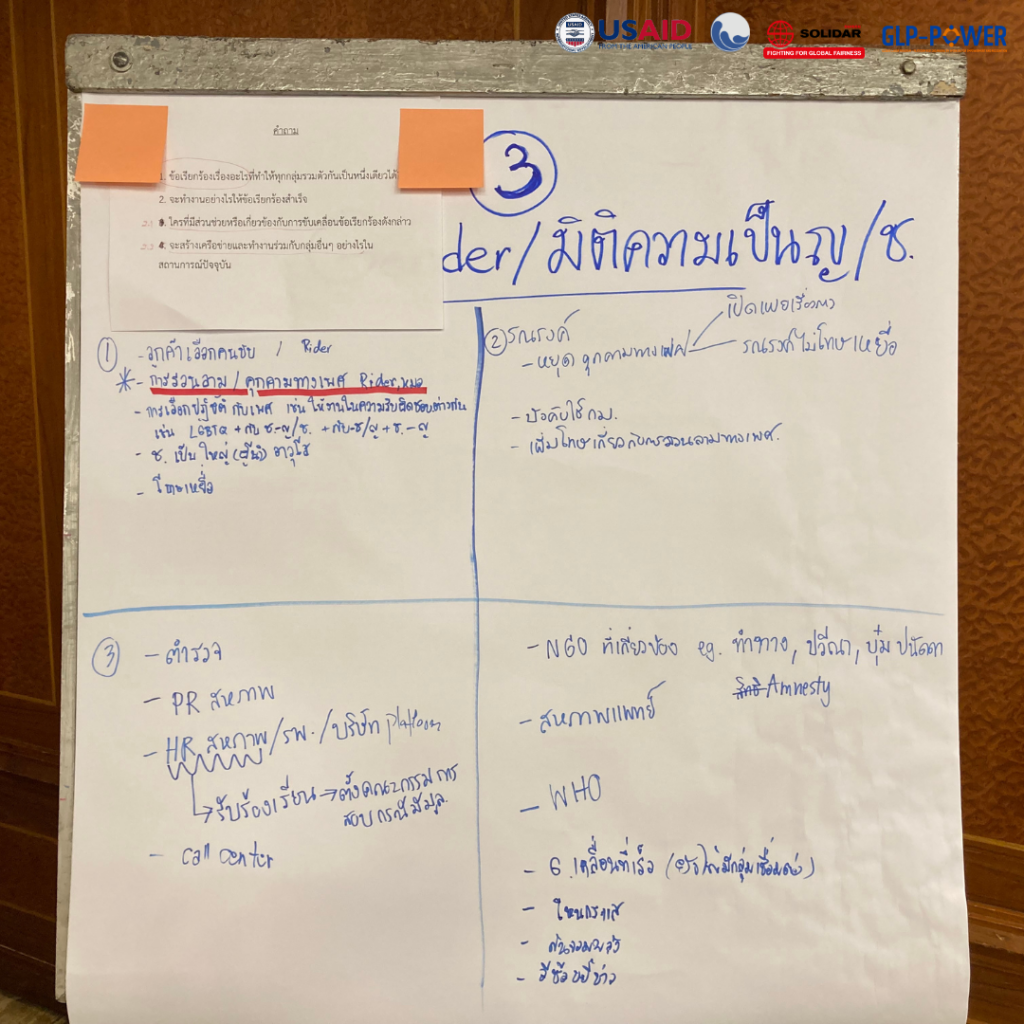
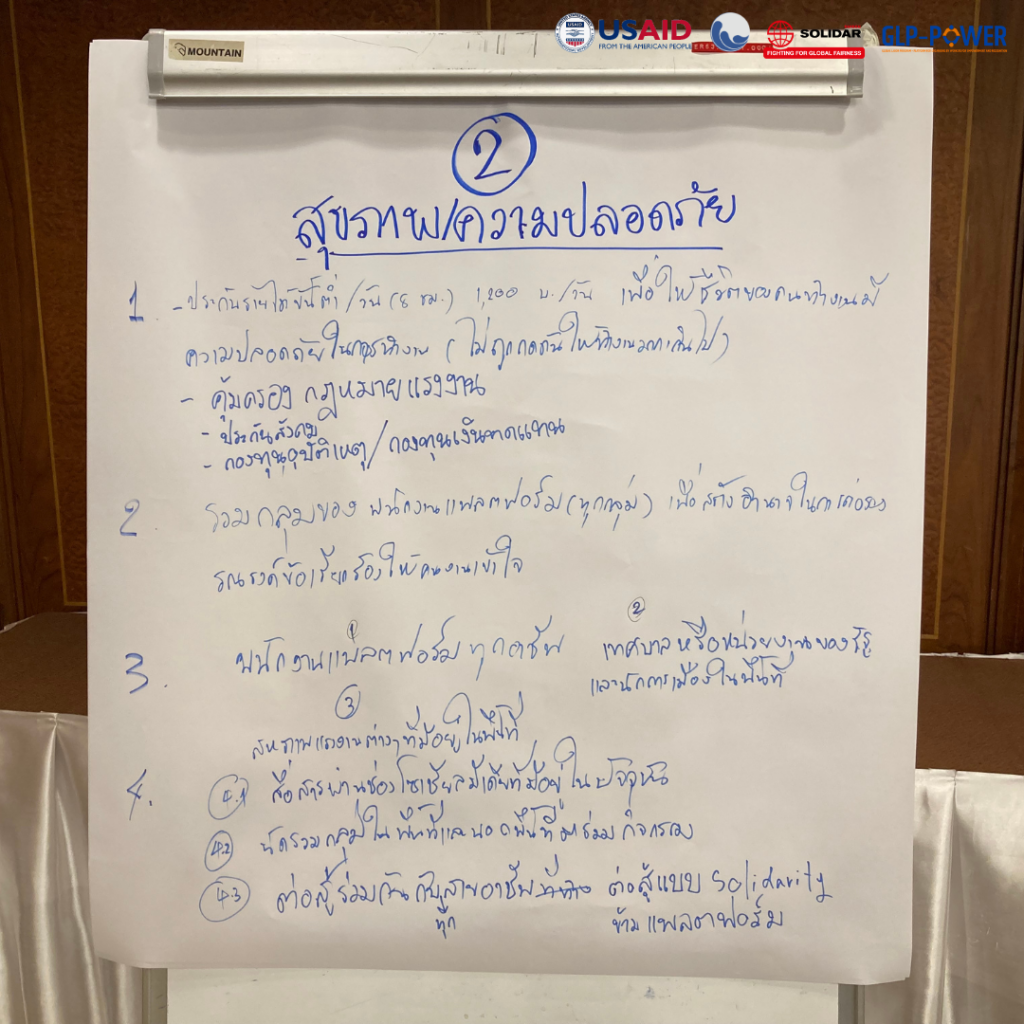
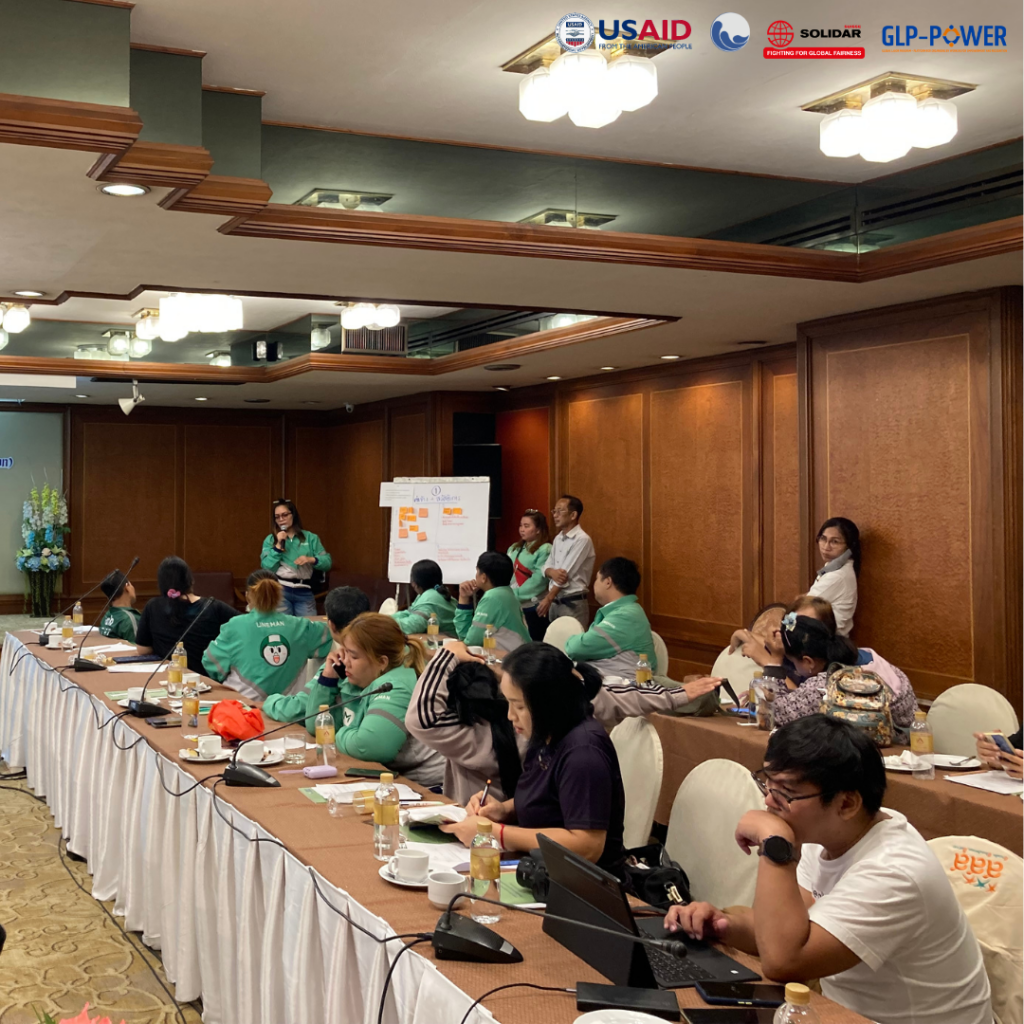
Upcoming Events
Save the Date: May 1st
Join us in celebrating International Workers’ Day on May 1st! This global event is a powerful reminder of the importance of workers’ rights and labor movements worldwide. JELI invites all those interested to join the activities for a day of solidarity. Let’s come together to honor the hard work and resilience of workers everywhere.
🚩Bangkok: May Day 2024 – Workers’ Union
✊May 1st, 2024 4.00 PM – 8.00 PM At the Bangkok Art and Culture Center, Bangkok
International Workers’ Day is a day of celebration and unity for workers to come together and advocate for better lives. The Workers’ Union is organizing this event in collaboration with borderless labor network organizations. Explore various activity booths within the event.
For more information: Facebook : redtamper / Twitter : @chiangmaiworker
🚩Chaing Mai: May Day! May Day! International Workers’ Day
✊May 1st, 2024, at 4.30 PM At the Three Kings Monument, Chiang Mai
A grand procession starting from the Three Kings Monument to Tha Phae Gate, along with stage performances by workers. Let’s discuss labor issues and unite as workers.
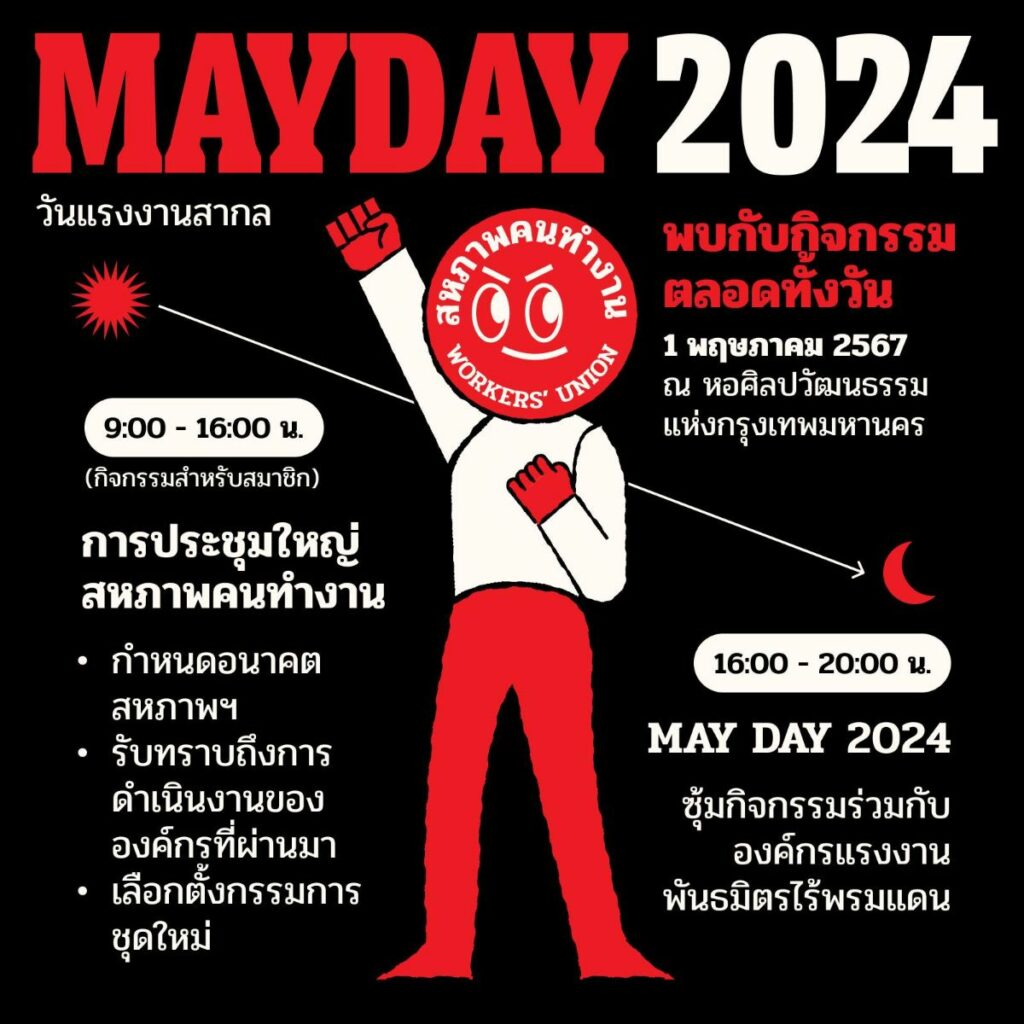
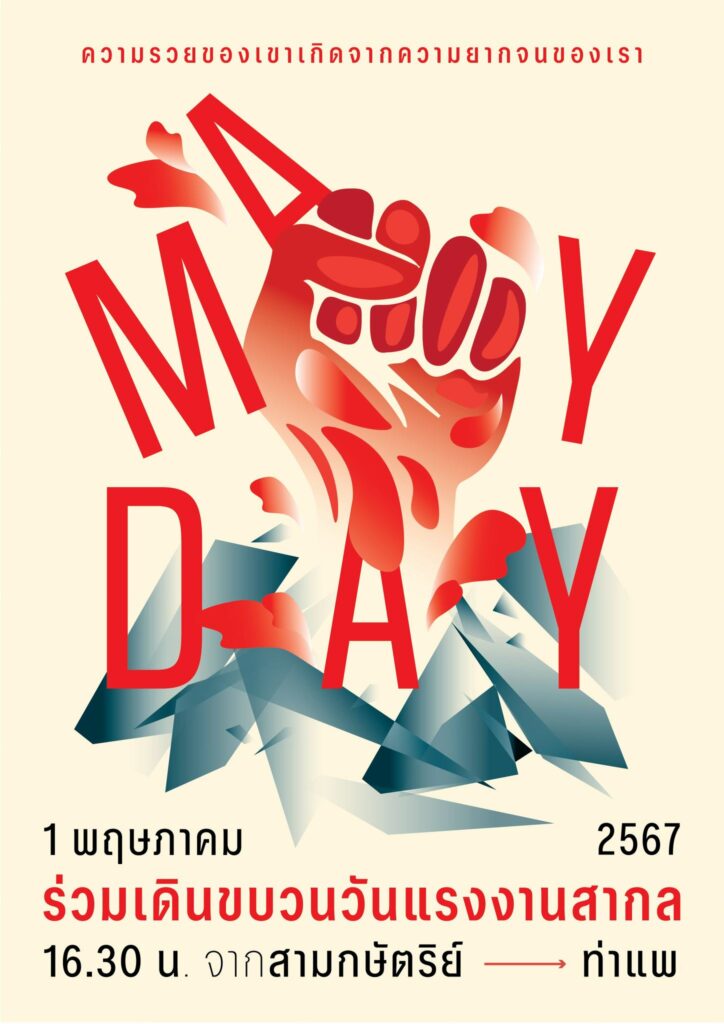
New to The JELI Team
Pakpoom Sawangkhum (Pak)

Pak is human rights lawyer focus on victims of crime, anti-trafficking in persons and forced labor among migrant population and stateless person. He had extensive experience with non-governmental organization in the field of human rights, safe migration, and labor justice. Pak joined JELI as a Labor Organizer.
Kanokkarn Manop (Prim)

Prim joins JELI as a new Knowledge Management and Communication Office. With a diverse background in international cooperation, social development, and local community engagement, she brings her passion to her role in using media and communication to create awareness and social change creatively.
